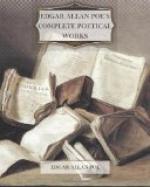In speaking of the Poetic Principle, I have no design to be either thorough or profound. While discussing very much at random the essentiality of what we call Poetry, my principal purpose will be to cite for consideration some few of those minor English or American poems which best suit my own taste, or which, upon my own fancy, have left the most definite impression. By “minor poems” I mean, of course, poems of little length. And here, in the beginning, permit me to say a few words in regard to a somewhat peculiar principle, which, whether rightfully or wrongfully, has always had its influence in my own critical estimate of the poem. I hold that a long poem does not exist. I maintain that the phrase, “a long poem,” is simply a flat contradiction in terms.
I need scarcely observe that a poem deserves its title only inasmuch as it excites, by elevating the soul. The value of the poem is in the ratio of this elevating excitement. But all excitements are, through a psychal necessity, transient. That degree of excitement which would entitle a poem to be so called at all, cannot be sustained throughout a composition of any great length. After the lapse of half an hour, at the very utmost, it flags—fails—a revulsion ensues—and then the poem is, in effect, and in fact, no longer such.
There are, no doubt, many who have found difficulty in reconciling the critical dictum that the “Paradise Lost” is to be devoutly admired throughout, with the absolute impossibility of maintaining for it, during perusal, the amount of enthusiasm which that critical dictum would demand. This great work, in fact, is to be regarded as poetical only when, losing sight of that vital requisite in all works of Art, Unity, we view it merely as a series of minor poems. If, to preserve its Unity—its totality of effect or impression—we read it (as would be necessary) at a single sitting, the result is but a constant alternation of excitement and depression. After a passage of what we feel to be true poetry, there follows, inevitably, a passage of platitude which no critical prejudgment can force us to admire; but if, upon completing the work, we read it again; omitting the first book—that is to say, commencing with the second—we shall be surprised at now finding that admirable which we before condemned—that damnable which we had previously so much admired. It follows from all this that the ultimate, aggregate, or absolute effect of even the best epic under the sun, is a nullity—and this is precisely the fact.
In regard to the Iliad, we have, if not positive proof, at least very good reason, for believing it intended as a series of lyrics; but, granting the epic intention, I can say only that the work is based in an imperfect sense of Art. The modern epic is, of the supposititious ancient model, but an inconsiderate and blindfold imitation. But the day of these artistic anomalies is over. If, at any time, any very long poem were popular in reality—which I doubt—it is at least clear that no very long poem will ever be popular again.




